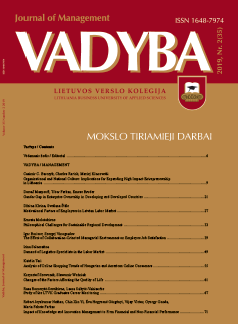GENDER GAP IN ENTERPRISE OWNERSHIP IN DEVELOPING AND DEVELOPED COUNTRIES
GENDER GAP IN ENTERPRISE OWNERSHIP IN DEVELOPING AND DEVELOPED COUNTRIES
Author(s): Maayoufi Dorsaf, Emese Bruder, Farkas TiborSubject(s): Gender Studies, Business Economy / Management
Published by: Lietuvos verslo kolegija
Keywords: woman entrepreneurship; performance; ownership; productivity; developed economy; developing economy;
Summary/Abstract: There have been few researches focusing on the role of women in business and their influence on both economics and entrepreneurship fields. In this paper, we aim to investigate the role played by women, in three different countries, Hungary, Lithuania and Tunisia, with three different cultures and economic background. We focus on their contribution to the field of creative business ventures. Females witnessed a slower pace in their paths of business ownership not only with regards to the type of business owned, but also to the size of it as well as the performance rating of it.Several factors are possibly responsible for the gap in lower labour productivity of female-managed firms relative to male-managed firms: fewer female than male managed firms protect themselves from crime and power outages, have their own websites, and are (co-)owned by foreigners. In addition, in the manufacturing sector, female-managed firms are less capitalized and have lower labour cost than male-managed firms. Those results indicate a need to recognize the diversity that exists among transition countries and developing countries, reflecting different inheritances from different indicators such as the characteristics of the enterprise, performance level and ownership.It is a fact, that entrepreneurship support services, such as government provision of information, training and funding, differs between male and female. In Tunisia, a developing country characterized by high level of unemployment, particularly of women, the existing support services are inadequate for promoting female entrepreneurship. In Hungary, on an average 31% of the companies have women leaders or have women with authority to sign in the name of the company. However, in small and medium-sized companies, the numbers change drastically.In Lithuania, women enter the labour market with a higher level of education than men do, but this does not adequately determine their position as it is noticed that women hold less prestigious and less well-paid jobs. They also occupy lower positions compared to men, as they tend to be recruited in less well-paid sectors.Our results suggest that there are important differences in the experiences of women in these countries compared to the male ones as we notice gender differences in labour productivity in the manufacturing sector. The results reveal a sizable unconditional gap between the two genders based on the female management which is more strongly associated with labour productivity than female participation in ownership, which has been the focus of most recent studies. Our data is extracted from the 2013 wave of Enterprise Surveys published by World Bank Group.
Journal: VADYBA
- Issue Year: 35/2019
- Issue No: 2
- Page Range: 21-26
- Page Count: 6
- Language: English

